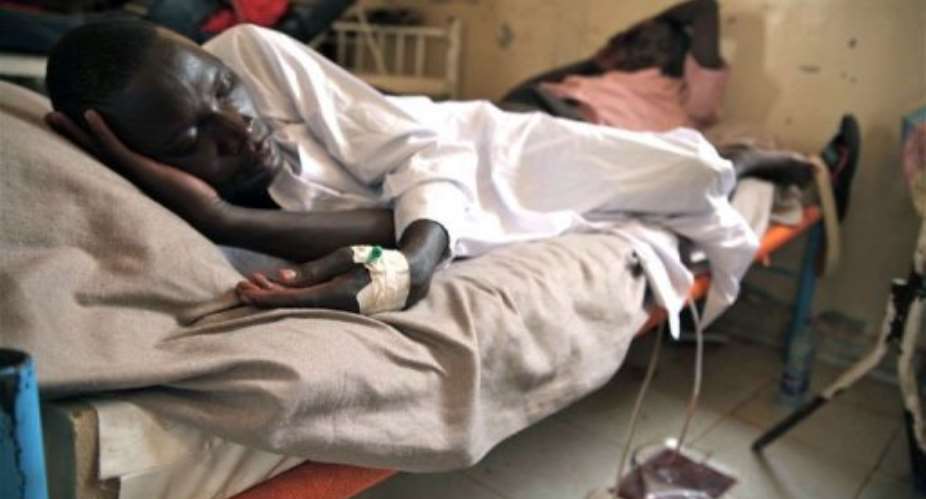KHARTOUM, Sudan (AFP) - As guns blazed on the border between Sudan and South Sudan in recent days, the air waves and newspapers of both countries fired salvos of their own in an intense propaganda war.
Almost two weeks ago the clashes between the neighbours began along their undemarcated and disputed frontier in the most serious unrest since South Sudan gained independence from Khartoum last July, after Africa's longest war.
International fears have mounted of a return to full-blown conflict.
But with access to the war zone restricted on the Sudanese side the full extent of recent fighting remains unclear, leaving much of the local media parroting inflammatory government rhetoric.
The African Union, which hosted failed talks between the two sides in the Addis Ababa this week, proposed the "immediate halting of all forms of negative media propaganda ... without severely affecting the freedom of the press."
That was among six proposals, including an immediate end to hostilities, made by the AU, but not signed by either side.
"They have noticed that during the last weeks the media really played a very negative role," said Faisal Mohammed Salih, a media consultant and political columnist for a Khartoum newspaper.
In keeping with the shrill rhetoric, South Sudan's lead negotiator Pagan Amum accused the Khartoum delegation of walking out of the talks, saying "war mongering" prevented them from signing the agreement.
He also claimed South Sudan's army downed a Sudanese fighter jet over a border area on the South, but Sudan rejected the claim as well as the accusation that it refused to sign a deal.
That has been the pattern since late last month: a series of accusations and counter-accusations, often supported by little evidence.
The battle in Sudan's South Kordofan state, which Sudan claimed was penetrated by Southern troops, is a media as well as a military war, Khartoum's State Minister of Information Sana Hamad said last Monday.
She said a media campaign by "hostile circles ... reflects unreal pictures and situations in South Kordofan," the official SUNA news agency reported.
Zach Vertin, senior analyst for Sudan and South Sudan with the International Crisis Group think-tank, said "high rhetoric is something of a national pastime, and both sides are now seeking to control the narrative.
"But what's more telling is that the parties are still coming to the table, still talking, as both sides know a deal is in their mutual interest."
African Union mediator Thabo Mbeki held talks on Thursday in Juba with South Sudan President Salva Kiir in an attempt to defuse the escalating crisis. Mbeki arrived on Saturday in Khartoum for discussions with President Omar al-Bashir.
Sudanese officials flew a delegation of journalists, including an AFP correspondent, to the scene of recent north-south clashes in the oil-rich Heglig border region for a few hours, but independent reporting in the area has not been permitted.
Reporters have had more freedom to travel in South Sudan but, in the absence of extensive coverage from the field, Salih told AFP government-owned radio and television stations in both countries have been used as a "gun machine" to spread hatred and rhetoric.
Some of the countries' newspapers, however, still try to operate more professionally, "so they cannot be used in this fight, this media fight," Salih added.
"But maybe in the north or in the South, if you try to be objective from the Western standard or international standard in your stories, you will be described as a traitor or someone who doesn't defend the national interests", said the columnist, who also works with Teeba Press, a media training agency and advocate for freedom of expression.
Sudan's army has made repeated allegations of incursion by Southern troops, while the South in turn has claimed numerous air strikes by the north.
Media on both sides of the border have reported exaggerated claims of losses from the opposing country, while minimising their own casualties, said Salih.
He agrees that in this war, an old maxim applies: Truth is the first casualty.





 Akufo-Addo commissions Phase II of Kaleo solar power plant
Akufo-Addo commissions Phase II of Kaleo solar power plant
 NDC panics over Bawumia’s visit to Pope Francis
NDC panics over Bawumia’s visit to Pope Francis
 EC blasts Mahama over “false” claims on recruitment of Returning Officers
EC blasts Mahama over “false” claims on recruitment of Returning Officers
 Lands Minister gives ultimatum to Future Global Resources to revamp Prestea/Bogo...
Lands Minister gives ultimatum to Future Global Resources to revamp Prestea/Bogo...
 Wa Naa appeals to Akufo-Addo to audit state lands in Wa
Wa Naa appeals to Akufo-Addo to audit state lands in Wa
 Prof Opoku-Agyemang misunderstood Bawumia’s ‘driver mate’ analogy – Miracles Abo...
Prof Opoku-Agyemang misunderstood Bawumia’s ‘driver mate’ analogy – Miracles Abo...
 EU confident Ghana will not sign Anti-LGBTQI Bill
EU confident Ghana will not sign Anti-LGBTQI Bill
 Suspend implementation of Planting for Food and Jobs for 2024 - Stakeholders
Suspend implementation of Planting for Food and Jobs for 2024 - Stakeholders
 Tema West Municipal Assembly gets Ghana's First Female Aircraft Marshaller as ne...
Tema West Municipal Assembly gets Ghana's First Female Aircraft Marshaller as ne...
 Dumsor is affecting us double, release timetable – Disability Federation to ECG
Dumsor is affecting us double, release timetable – Disability Federation to ECG
